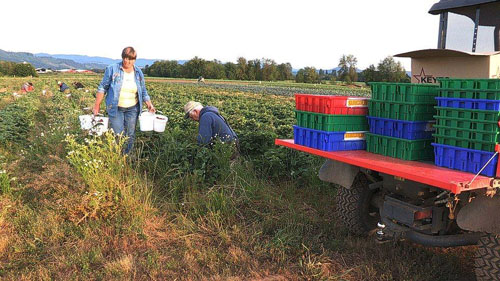Walking through the bustling aisles of the local farmers markets provides one of the telltale signs that spring is in full swing.
Food awareness piques Portland interest

Gaining Ground will screen this weekend at Portland State. Photo © Media Project
Walking through the bustling aisles of the local farmers markets provides one of the telltale signs that spring is in full swing.
Fresh, organic fruits and vegetables, homemade jams, beautiful flowers and countless other locally made commodities and goodies become available to the public after a long absence during the winter months. The wait makes the freshness of those foods all the sweeter.
The farmers who make our food accessible have interesting stories of their own. This Saturday, the university’s 5th Avenue Cinema will screen a documentary-in-progress focusing on just that. Gaining Ground isn’t finished just yet, but the screening aims to raise awareness of local organic farmers, their cause and the impact they have on their communities.
Gaining Ground concentrates on three different farms located in Oregon and California, each with their own unique and inspirational story explaining how they got involved in the organic produce business.
Filmmakers Barbara Bernstein and Elaine Velazquez will present Gaining Ground this weekend. Velazquez thought it was important to shine a light on the fact that “conventional farmers have no control over the prices charged for their products,” she said.
One of the biggest goals for these farmers is to price their food within a range that everybody can afford—healthy, quality food shouldn’t just be accessible to those with the disposable income to afford it.
One of the farms that Gaining Ground focuses on is the Sun Gold Farm in the tiny town of Verboort, Ore., in the Tualatin Valley.
The farm operated for four generations as a dairy farm, but because of regulation and operation fee changes made the risky switch to growing and selling organic produce. They sell fruits and vegetables to community members at prices set by the farmers
themselves.
Vicki Hertel runs the farm with her husband and their two children. The Hertels’ farm had been filmed before, for another documentary, Urban Growth, and the family was very excited to be a part of this film as well.
Hertel talked about the importance of not only “thinking about our food supply and where it’s coming from in the future,” but also the alterations, genetic and chemical, that have been made to food these days.
The Willamette Valley supplies approximately 60 percent of the world’s grass seed, and up until a few years ago the Stalford Seed Farm was part of that system.
But they’ve been working toward converting their 10,000-acre grass farm to grow organic produce for the community, which had otherwise only imported any grains or seeds from outside the state or country.
Stalford made a commitment to progressively go 100 percent organic and combat the sales of genetically modified foods, even if it means fiscal uncertainty for a few years.
Richmond, Calif., also called the Iron Triangle, is home to an urban gardening center, Urban Tilth, that allows local community members to grow and harvest their own organic vegetables. The area is notorious for its violence and poverty, as well as for being a “food desert.”
A food desert is an “urban area that has little to no access to fresh food—the only available food resources are the 7-Eleven-style corner or liquor stores,” as Bernstein put it.
The garden’s creator and supervisor, Doria Robinson, takes on interns and students looking for jobs and personally teaches them how to care for the plants, which promote a healthy diet and an increased sense of self-worth.
The overall theme of the film is food justice, which Velazquez described as “all people having access to healthy, locally grown, organic food,” she said. “It’s not just for people who can afford the healthy stuff.”
Bernstein elaborated on this thought, saying that the film looks at all aspects of the food community, such as people who have no power over what foods are available to them, low-wage earners and immigrants. These local farms make an effort to ensure that “everybody has the right to eat good food sold at a price people can afford,” Bernstein said.
Velazquez and Bernstein will be joined at the event by some of the farmers featured in the documentary; they will participate in a discussion with the audience after the screening.
Gaining Ground
Saturday, June 1, at 7 p.m.
510 SW Hall St.
$5 general admission
Very seldom does the opportunity arise for people to meet those involved in such a relevant and informative film. The Sun Gold Farm, along with many other farms in the area, owes its initial and continued success to sales of its goods at the Portland Farmers Market, according to Hertel.
Hertel suspects the film will not only be relevant to but also very successful among people living in the Northwest. In addition to featuring local farmers, Portland is also known for its farmers markets and its support of locally grown food.
Those involved hope that the film can celebrate the farmers who have made a commitment to serving their communities and encouraging people to start thinking local, not global.





